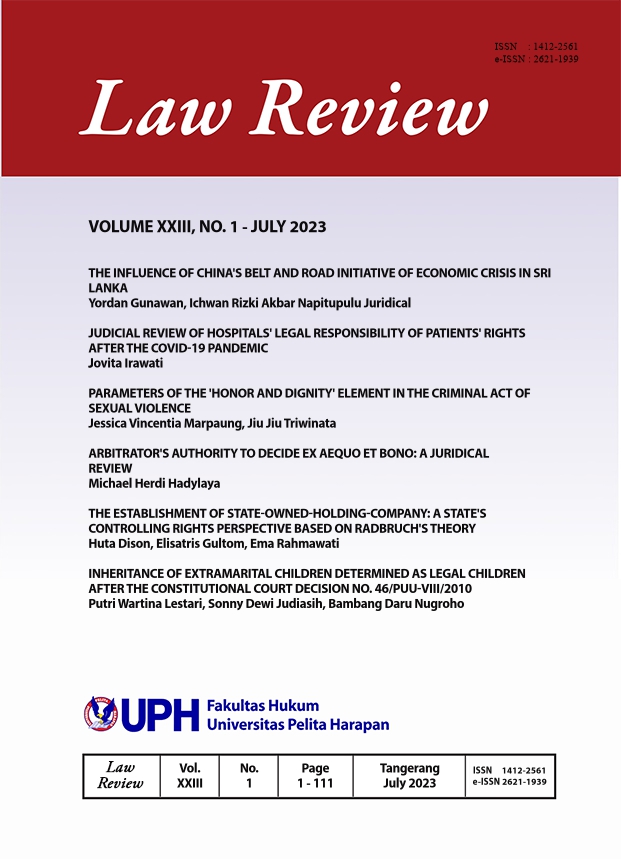Arbitrator’s Authority to Decide Ex Aequo et Bono: A Juridical Review
DOI:
https://doi.org/10.19166/lr.v23i1.7338Keywords:
Arbitration, Arbitrator, Ex Aequo et BonoAbstract
Arbitration is a dynamic practice. One of the issues to consider is the implementation of ex aequo et bono by arbitrators, which many parties see as requiring prior approval from the parties so that arbitrators can make decisions based on ex aequo et bono. This study concludes that the arbitrator's authority to decide ex aequo et bono is not derived from the parties' agreement but rather from the arbitrator's inherent authority. First, because this principle is consistent with the spirit of arbitration, the Arbitrator has the authority to decide ex aequo et bono. Second, Law Number 48 Year 2009 concerning Judicial Authority imposes an obligation to investigate, adhere to, and comprehend legal values and the sense of justice in society. Third, no provision in Law Number 30 Year 1999 concerning Arbitration and Alternative Dispute Resolution requires the parties to agree in advance on the grant of ex aequo et bono.References
Laws and Regulations
Law Number 30 Year 1999 concerning Arbitration and Alternative Dispute Resolutions.
Law Number 48 Year 2009 concerning Judicial Authority.
Law Number 12 Year 2011 concerning the Establishments of Laws and Legislations.
Law Number 13 Year 2022 concerning the Second Amendment to Law Number 12 Year 2011 concerning the Establishments of Laws and Legislations.
Books
Amiruddin and Zainal Asikin. Pengantar Metode Penelitian Hukum. Depok: Rajawali Press, 2020.
Bercovitch, Jacob and Richard Jackson. Conflict Resolution in the Twenty-First Century: Principles, Methods, and Approaches. Ann Arbor: University of Michigan Press, 2009.
Bhat, P. Ishwara. Idea and Methods of Legal Research. First edition. New Delhi: Oxford University Press, 2019.
Briggs, Adrian. Civil Jurisdiction and Judgments, Sixth edition. New York: Informa Law from Routledge, 2015.
Cohen, Morris L. and Kent C. Olson. Legal Research in a Nutshell, Thirteenth edition, West Nutshell Series. St. Paul, Minn: West Academic Publishing, 2018.
Harahap, M. Yahya. Hukum Acara Perdata. Jakarta: Sinar Grafika, 2008.
McIntyre, Joe. The Judicial Function: Fundamental Principles of Contemporary Judging. Singapore: Springer, 2019.
Mertokusumo, Sudikno. Mengenal Hukum Suatu Pengantar. Yogyakarta: Cahaya Atma Pustaka, 2010.
Mertokusumo, Sudikno. Teori Hukum. Yogyakarta: Cahaya Atma Pustaka, 2012.
Musson, Anthony. “Arbitration and the Legal Profession in Late Medieval England.” in Law and Legal Process, edited by Matthew Dyson and David Ibbetson, 1st ed., 56-76. Cambridge: Cambridge University Press, 2013. https://doi.org/10.1017/CBO9781139629140.005.
Sidharta, Bernard Arief. Refleksi Tentang Struktur Ilmu Hukum. Bandung: Mandar Maju, 2009.
Soekanto, Soerjono. Pengantar Penelitian Hukum. Jakarta: Penerbit Universitas Indonesia, 2008.
Soekanto, Soerjono and Sri Marmudji. Penelitian Hukum Normatif. Jakarta: Penerbit Rajawali, 2001.
Sourdin, Tania. Alternative Dispute Resolution, 5th edition. Rozelle, N.S.W: Thomson Reuters (Professional) Australia Ltd, 2016.
Tresna, R. Komentar HIR. Jakarta: PT Pradnya Paramita, 2001.
Triana, Nita. Alternative Dispute Resolution (Penyelesaian Sengketa Alternatif dengan Model Mediasi, Arbitrase, Negosiasi, dan Konsiliasi). Yogyakarta: Kaizen Sarana Edukasi, 2019.
Winarta, Frans Hendra. Hukum Penyelesaian Sengketa. Jakarta: Sinar Grafika, 2012.
Journal Articles
Debbarma, Shantaraj. “The Justice: A Moral Virtue.” International Journal of Research and Review 7, no. 1 (2020): 266-272. https://www.ijrrjournal.com/IJRR_Vol.7_Issue.1_Jan2020/IJRR0038.pdf.
Menkel-Meadow, Carrie. “From Legal Disputes to Conflict Resolution and Human Problem Solving: Legal Dispute Resolution in a Multidisciplinary Context.” Journal of Legal Education 54, no. 1 (2004): 7-29. https://scholarship.law.georgetown.edu/cgi/viewcontent.cgi?article=1587&context=facpub.
Saputra, Rian. “Pergeseran Prinsip Hakim Pasif Ke Aktif pada Praktek Peradilan Perdata Perspektif Hukum Progresif.” Wacana Hukum 25, no. 1 (2019): 10-18. https://doi.org/10.33061/1.jwh.2019.25.1.2750.
Stipanowich, Thomas J. “Arbitration: The "New Litigation".” University of Illinois Law Review 2010, no. 1 (2010): 1-60. http://illinoislawreview.org/wp-content/ilr-content/articles/2010/1/Stipanowich.pdf.
Subagyono, Bambang Sugeng Ariadi, Johan Wahyudi, and Razky Akbar. “Kajian Penerapan Asas Ultra Petita pada Petitum Ex Aequo Et Bono,” Yuridika 29, no. 1 (2014): 100-112, https://doi.org/10.20473/ydk.v29i1.360.
Taduri, Januari Nasya Ayu. “The Legal Certainty and Protection of Foreign Investment Againsts Investment Practices in Indonesia.” Lex Scientia Law Review 5, no. 1 (2021): 119-138. https://doi.org/10.15294/lesrev.v5i1.46286.
Tan, David. “Analisa Yuridis Pengesampingan Prinsip-Prinsip Keadilan dan Kepatutan dalam Proses Pengambilan Keputusan oleh Arbiter.” Humani (Hukum Dan Masyarakat Madani) 11, no. 1 (2021): 38-56. http://dx.doi.org/10.26623/humani.v11i1.2772.
Tektona, Rahmadi Indra. “Arbitrase Sebagai Alternatif Solusi Penyelesaian Sengketa Bisnis di Luar Pengadilan.” Pandecta 6, no. 1 (2011): 86-94. https://doi.org/10.15294/pandecta.v6i1.2327.
Trakman, Leon. “Ex Aequo et Bono: Demystifying an Ancient Concept.” Chicago Journal of International Law 8, no. 2 (2008): 621-642. https://chicagounbound.uchicago.edu/cjil/vol8/iss2/11.
Wijayanta, Tata and Sandra Dini Febri Aristya. “Disparitas Putusan Perkara Sengketa Tanah Terkait Penerapan Hukum Formil.” Jurnal Yudisial 7, no. 2 (2014): 173-195. http://dx.doi.org/10.29123/jy.v7i2.86.
Thesis or Dissertations
Baddack, Frank. “Lex Mercatoria: Scope and Application of the Law Merchant in Arbitration.” Thesis, University of the Western Cape, Cape Town, 2006.
Fitriyanti, Fadia. “Harmonisasi Penerapan Asas Ex Aequo Et Bono Dalam Sengketa Bisnis pada Arbitrase Nasional dan Arbitrase Syariah.” PhD diss., Universitas Gadjah Mada, Yogyakarta, 2017.
Wibisono, Stanley Hariman. “Analisis Yuridis Putusan Arbitrase Tentang Penentuan Eskalasi Harga Kontrak yang Tidak Diatur Sebelumnya.” Thesis, Universitas Islam Indonesia, Yogyakarta , 2007.
News or Magazine Articles
Hasan, Mohamad Toha. “Penyelesaian Sengketa Melalui Lembaga Arbitrase Di Indonesia.” BP Lawyers, December 3, 2021. https://bplawyers.co.id/2021/12/03/penerapan-ex-aequo-et-bono-dalam-penyelesaian-sengketa-melalui-lembaga-arbitrase-di-indonesia/.
Hertiawan, Erie, et al., “Ex Aequo et Bono: Applying Equity and Fairness under Indonesian Arbitration Law.” AHP, March 28, 2022. https://www.ahp.id/ex-aequo-et-bono-applying-equity-and-fairness-under-indonesian-arbitration-law/.
Downloads
Published
How to Cite
Issue
Section
License
Authors who publish with this journal agree to the following terms:
1) Authors retain copyright and grant the journal right of first publication with the work simultaneously licensed under a Creative Commons Attribution License (CC-BY-SA 4.0) that allows others to share the work with an acknowledgement of the work's authorship and initial publication in this journal.
2) Authors are able to enter into separate, additional contractual arrangements for the non-exclusive distribution of the journal's published version of the work (e.g., post it to an institutional repository or publish it in a book), with an acknowledgement of its initial publication in this journal.
3) Authors are permitted and encouraged to post their work online (e.g., in institutional repositories or on their website). The final published PDF should be used and bibliographic details that credit the publication in this journal should be included.





